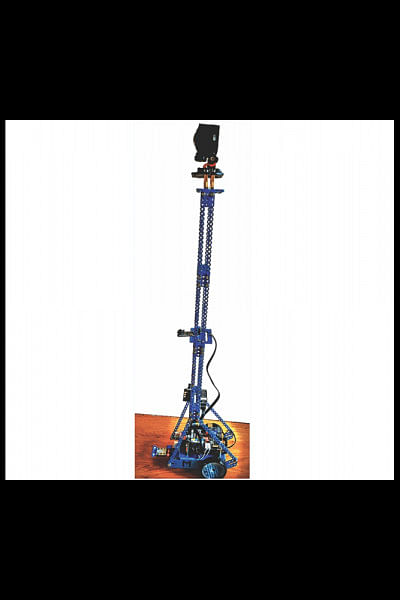Robots to tape crime scenes

Seeing is believing, but how often do jurors get to see a crime scene before adjudication?
In courts, lawyers try to paint a word picture with their arguments and evidence, like photos and sketches, to recreate the crime scene but a lot of it is left to the imagination of judges and juries.
This could all change with cheap virtual reality.
Mehzeb Chowdhury, a Bangladeshi PhD researcher in forensic science and criminal investigations at the United Kingdom's Durham University, is upbeat that he could develop robots that would help create virtual reality which in turn would teleport judges and juries to the crime scene without needing them to leave the courtroom.
Mehzeb, a member of the university's School of Applied Social Sciences, believes that he and his colleagues would be able to develop the relatively low-cost system enabling judges and juries to have an almost firsthand experience of standing at the crime scene.
Contacted via email, Mehzeb told The Daily Star, "The system will hopefully be ready by the end of the year. The idea is to work with police departments in the UK, and the US ... I have had fantastic support so far from forensic science policymakers and prominent lawyers."
After Mehzeb published his thoughts on this in the Conversation, an independent non-profit media outlet in the UK on August 26, it went viral in the British media. Russian radio Sputnik published an interview as well.
Durham University has it posted on its website.
Mehzeb said, "My colleagues and I at Durham University are developing a robot system inspired by NASA's Curiosity Mars rover that could capture immersive footage of the crime scenes."
He said the virtual-reality robots would take 360° videos and photographs, which could be played on any computer or smart phone with an appropriate app.
With a basic adaptor headset, such as the Google cardboard, it could recreate a virtual reality experience at a low cost.
"It requires no rendering of 3D graphics, no powerful computers and captures the most accurate snapshot of the crime scene from every angle. Users can turn their heads, look up and down, zoom in and out," he said.
As well as helping judges and juries in the courtroom, the system could allow investigators to revisit crime scenes as they were at the time of the initial forensic examination, said Mehzeb, nominated twice in a row for the Durham University Excellence in Learning and Teaching Awards for the academic years 2014-15 and 2015-16.
"Information could be captured in three ways. A CSI [crime scene investigator] could set a predefined path for the rover, recording high definition video images in 360° as it goes. Or it could be controlled via a Bluetooth remote or a smart phone or a tablet. Alternatively, the rover could use ultrasonic, motion and infrared sensors to navigate around a scene and take photos and video by itself," explained Mehzeb.
He anticipates that the entire setup would cost just £299 (just over Tk 31,000), and the cost would go down further in the future, due to affordable open-source robotics kits built around cheap computer systems such as Raspberry Pi and Arduino.
Another development could be the use of Google's Tango project, which can render 3D images of scenes and terrain in real-time, potentially replacing crime-scene sketching. This would create an immersive experience with tracked motion, highlighting the precise distance between objects and relative position of the evidence at the scene.
He acknowledged that new technology had emerged that could enable CSIs to capture and relay a much more immersive and representative picture of crime scenes, using 3D imaging, panoramic videography, robotics and virtual reality.
He said, "One issue with 3D recreations and computer-generated virtual reality simulations is that they require expensive headsets, and top specification computers to work. The first generation of VR systems such as the HTC Vive [£759 or under Tk 79,000], PlayStation VR [£349.99 or over Tk 36,000] and Oculus Rift [£549 or over Tk 57,000] all come with hefty price tags and none of them work without an additional VR-ready computer or console."
Mehzeb Chowdhury is currently pursuing a research titled 'Crime Scene Science -- An Examination of the Methods, Skills and Techniques Employed by Crime Scene Investigators and the Contribution of Scene Work to Criminal Investigations and Prosecutions.'
His doctoral research project employs data from 40 participating police forces from England, Wales, Scotland, and Northern Ireland to construct one of the largest repositories of financial and personnel information on crime scene units in the UK.
More than a dozen police forces in the US form part of the same study, which comprehensively investigates the methods, methodologies, skills and techniques utilised by scene examiners, the potential value added by CSI work to criminal investigations in these jurisdictions, and the future of crime scene science in the realms of automation, robotics and artificial intelligence.
Mehzeb did his MSc from Durham University in 2013. He got his postgraduate diploma in Law in 2010 from Northumbria University. He graduated from University of London in 2009. He is a member of the bar councils of England and Wales and Bangladesh.

 For all latest news, follow The Daily Star's Google News channel.
For all latest news, follow The Daily Star's Google News channel. 



Comments